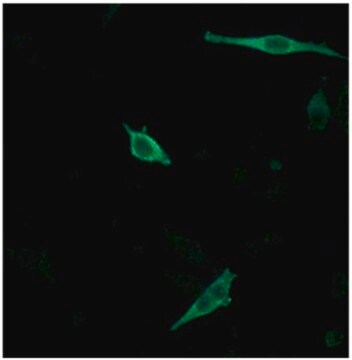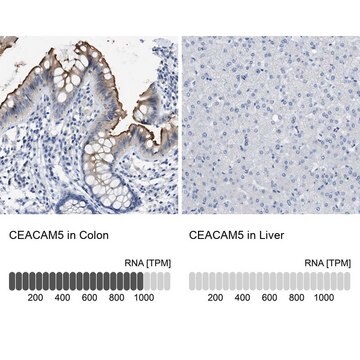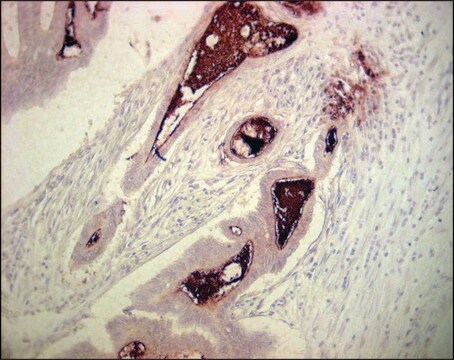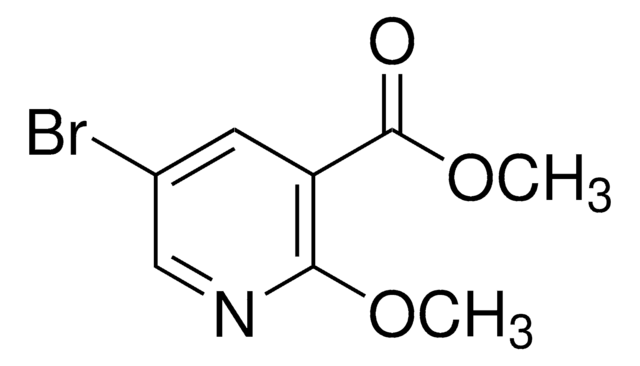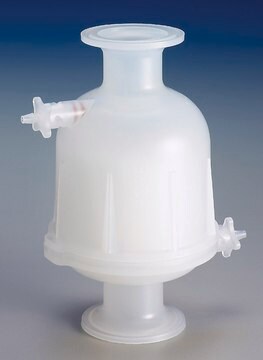推荐产品
生物源
mouse
品質等級
抗體表格
purified antibody
抗體產品種類
primary antibodies
無性繁殖
4D1/C2, monoclonal
物種活性
human
技術
ELISA: suitable
flow cytometry: suitable
immunohistochemistry: suitable
western blot: suitable
同型
IgG1κ
NCBI登錄號
UniProt登錄號
運輸包裝
wet ice
目標翻譯後修改
unmodified
基因資訊
human ... CEACAM1(634)
一般說明
CEACAM1(癌胚抗原相关粘附分子1)被认为是免疫球蛋白超家族成员,也是已知的上皮肿瘤抑制因子和血管生成生长因子。它与肌动蛋白基细胞骨架有关CEACAM1 也是多种人粘膜病原性细菌的细胞受体。CEACAM1活性的丧失与结肠直肠癌的发展有关。
免疫原
对应于人CEACAM1的重组蛋白。
表位:未知
應用
使用经验证可用于WB、IH的该抗-CEACAM1抗体(克隆4D1/C2 )检测CEACAM1。
免疫组化分析: 一个代表性批次被独立实验室用于检测非小细胞肺癌中的CEACAM1(Dango, S., et al. (2008).Lung Cancer.60:426-433)。
蛋白质印迹分析:一个代表性批次被独立实验室用于检测人粒细胞裂解液中的CEACAM1(Bogoevska, V. et al., (2006).Glycobiology.16(3): 197–209)。
流式细胞术分析:一个代表性批次被独立实验室用于通过 FACS分析检测人粒细胞中的CEACAM1(Bogoevska, V. et al., (2006).Glycobiology.16(3): 197–209)。
蛋白质印迹分析:一个代表性批次被独立实验室用于检测人粒细胞裂解液中的CEACAM1(Bogoevska, V. et al., (2006).Glycobiology.16(3): 197–209)。
流式细胞术分析:一个代表性批次被独立实验室用于通过 FACS分析检测人粒细胞中的CEACAM1(Bogoevska, V. et al., (2006).Glycobiology.16(3): 197–209)。
研究子类别
粘附(CAMs)
粘附(CAMs)
研究类别
细胞结构
细胞结构
品質
通过蛋白质印迹对HepG2细胞裂解液进行了评估。
蛋白质印迹分析:0.5 µg/ml的该抗体可在10 µg的HepG2细胞裂解液中检测到CEACAM1。
蛋白质印迹分析:0.5 µg/ml的该抗体可在10 µg的HepG2细胞裂解液中检测到CEACAM1。
標靶描述
观察值〜150 kDa。
通常观察到不同糖基化产生的~120-160 kDa的条带(Lauke, H., et al. (2004).Mol. Hum.Reprod.10(4):247-252)。
通常观察到不同糖基化产生的~120-160 kDa的条带(Lauke, H., et al. (2004).Mol. Hum.Reprod.10(4):247-252)。
外觀
形式:纯化
纯化的小鼠单克隆IgG1κ,溶于含0.1 M Tris-甘氨酸(pH 7.4),150 mM NaCl和0.05%叠氮化钠的缓冲液中。
蛋白G纯化
儲存和穩定性
自收到之日起,在2-8°C条件下可稳定保存1年。
分析報告
对照
HepG2 细胞裂解液
HepG2 细胞裂解液
其他說明
浓度:请参考批次特异性浓缩物的检验报告。
免責聲明
除非我们的产品目录或产品附带的其他公司文档另有说明,否则我们的产品仅供研究使用,不得用于任何其他目的,包括但不限于未经授权的商业用途、体外诊断用途、离体或体内治疗用途或任何类型的消费或应用于人类或动物。
未找到合适的产品?
试试我们的产品选型工具.
儲存類別代碼
12 - Non Combustible Liquids
水污染物質分類(WGK)
WGK 1
閃點(°F)
Not applicable
閃點(°C)
Not applicable
Sebastian Dango et al.
Lung cancer (Amsterdam, Netherlands), 60(3), 426-433 (2008-01-25)
Recent studies have challenged the previously postulated concept of a tumor-suppressive effect of carcinoembryonic antigen-related cell adhesion molecule 1 (CEACAM-1). A possible angiogenic influence of CEACAM-1 in non-small-cell lung cancer (NSCLC) has not been investigated so far. Therefore, we examined
Identification of membrane antigens in granulocytes and colonic carcinoma cells by a monoclonal antibody specific for biliary glycoprotein, a member of the carcinoembryonic antigen family.
Drzeniek, Z, et al.
Cancer letters, 56, 173-179 (1991)
Valentina Bogoevska et al.
Glycobiology, 16(3), 197-209 (2005-11-12)
The CEA-related cell adhesion molecule 1, CEACAM1, is a glycoprotein expressed on the surface of human granulocytes and lymphocytes, endothelia, and many epithelia. CEACAM1 is involved in the regulation of important biological processes, such as tumor growth, angiogenesis, and modulation
Monoclonal, anti-domain and anti-peptide antibodies assign the molecular weight 160,000 granulocyte membrane antigen of the CD66 cluster to a mRNA species encoded by the biliary glycoprotein gene, a member of the carcinoembryonic antigen gene family.
Stoffel, A, et al.
Journal of immunology (Baltimore, Md. : 1950), 150, 4978-4984 (1993)
Maria L Dupuis et al.
Journal of immunotherapy (Hagerstown, Md. : 1997), 38(9), 357-370 (2015-10-09)
Several lines of evidence show that de novo expression of carcinoembryonic antigen-related cell adhesion molecule 1 (CEACAM1) is strongly associated with reduced disease-free survival of patients affected by metastatic melanoma. Previously published investigations report that homophilic interactions between CEACAM1 expressed
我们的科学家团队拥有各种研究领域经验,包括生命科学、材料科学、化学合成、色谱、分析及许多其他领域.
联系技术服务部门

